Adventurous Kate contains affiliate links. If you make a purchase through these links, I will earn a commission at no extra cost to you. Thanks!
I hate to say it, but after nearly four years of near-constant travel, it’s becoming harder and harder for me to be impressed. Of course, I love places and I appreciate them and I enjoy almost every place I visit — but being knocked over in marvel, so impressed I can barely speak? That’s incredibly special and incredibly rare.
Which is why Skellig Michael, Ireland, was so memorable.
Skellig Michael is a rocky island off the southwest coast of Ireland that was home to monks for several centuries. It’s one of the most visually striking places I’ve ever visited, even on a cloudy day, and it’s also
And it’s VERY hard to get here. The choppy waters make it extraordinarily difficult to land, which makes a trip here all the more special.
Here’s everything I love about Skellig Michael.
Table of Contents
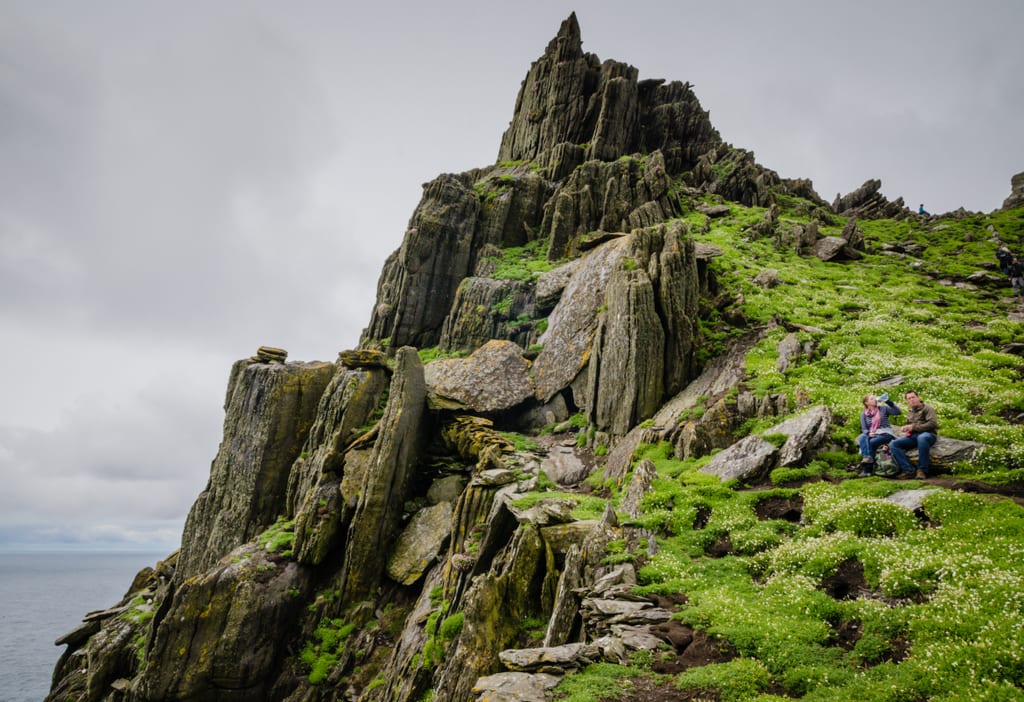
How to Visit Skellig Michael, Ireland
Getting to Skellig Michael is not an easy journey — due to rough seas and a challenging spot to moor, boats are able to make the trip only about half the time. If you get the chance, you must take it.
I had one chance to make it to Skellig Michael — which, in retrospect, was poor planning on my part — but I lucked out. On the morning I was to head out, I called the captain whose boat I had booked, Eoin Walsh, and he verified that although it was a borderline day, it was still safe to go.
Fantastic!
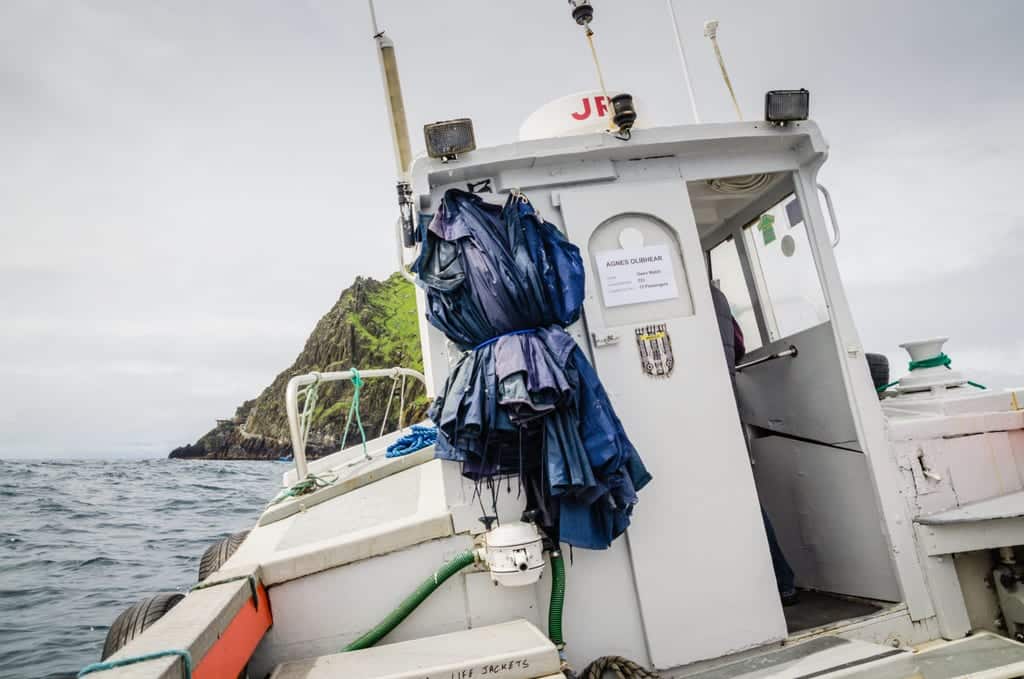
The Boat Ride to Skellig Michael
There aren’t ferries to Skellig Michael — you need to book a spot on a private boat, and most transfers cost €50 ($68 USD).
I wasn’t alone on Eoin’s boat, though — my fellow passengers were three very friendly fifty-something men from County Cork who had been friends since high school.
“We’ve always wanted to go to Skellig Michael, but it was so close by, we always thought we’d go someday. And it took us this long!” one of the men told me.
“I completely get that,” I told them. “I’m from Massachusetts, but I still haven’t been to Martha’s Vineyard or Nantucket.”
“Martha’s Vineyard?” one of the others asked. “I’ve been there.”
“Exactly,” I replied.
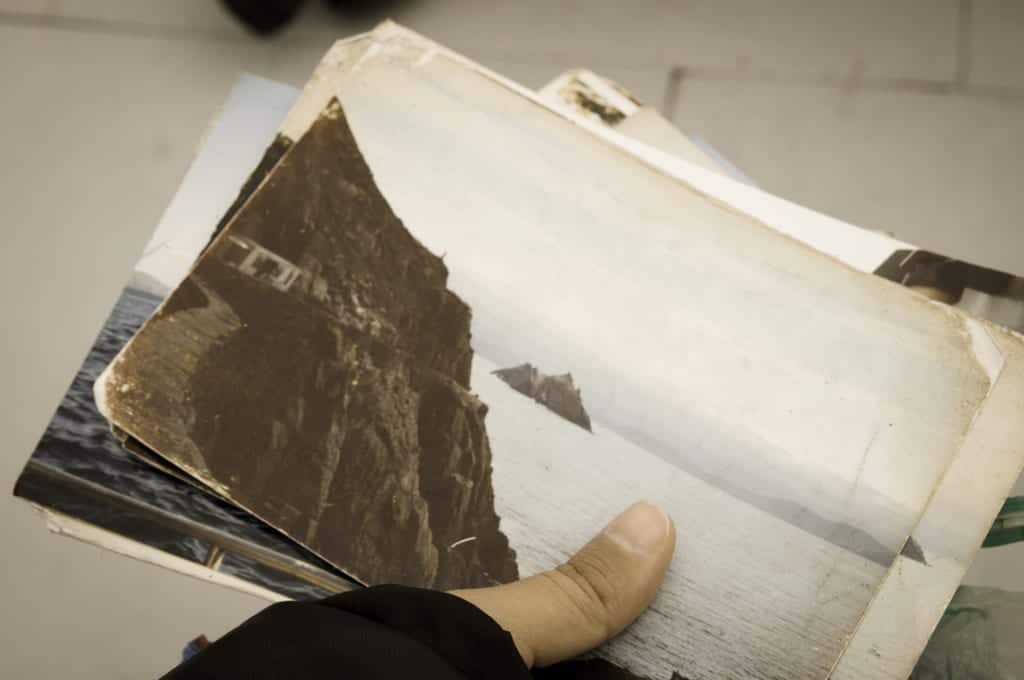
Eoin handed me some photos of Skellig Michael dating back decades. And that was the only time I looked down, because this was an extremely rough 90-minute journey to the island. I held tightly to a tire on the edge and wondered if we were going to be washed overboard!
The men were fairly nonplussed, and Eoin was calm. This was the wild north Atlantic; conditions were normal.
We first passed Small Skellig, the tiny island next door that is known for being a major ornithological habitat, and soon Skellig Michael came into full, beautiful focus.
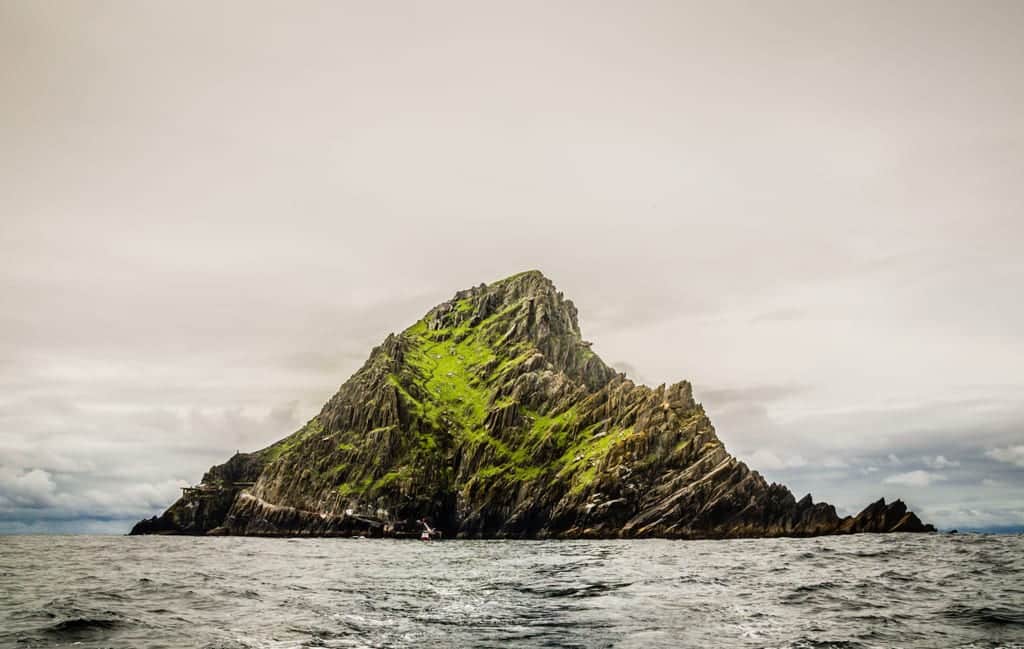
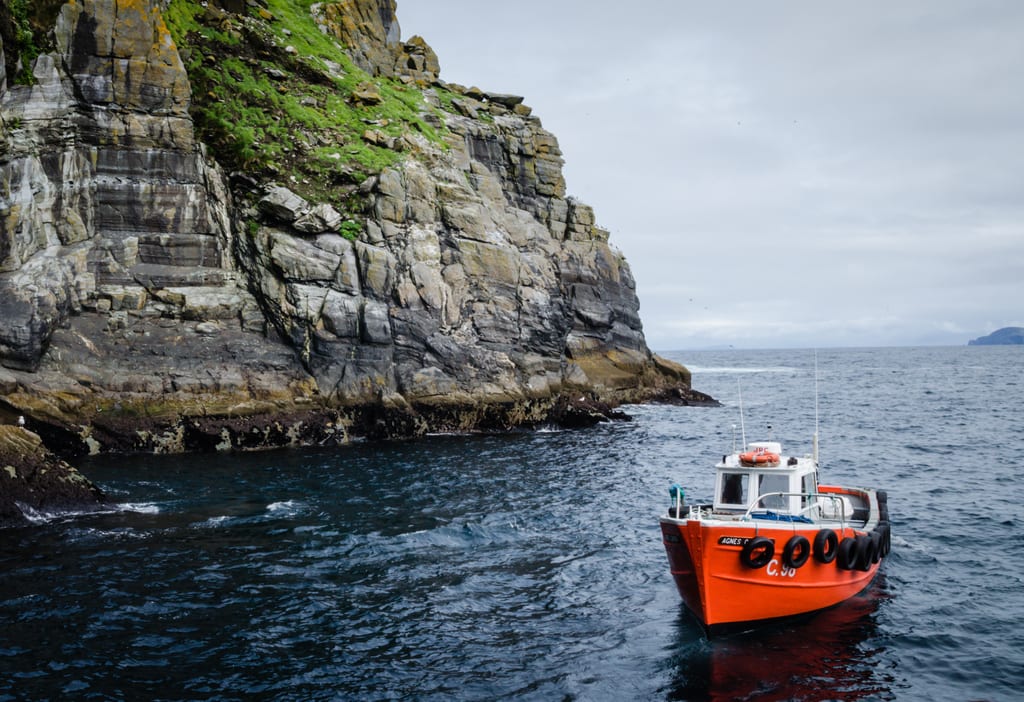
We docked and scrambled up the landing to the base of the island.
Eoin wasn’t coming with us — we had a few hours to explore on our own and he’d wait in the boat until we got back.
I couldn’t imagine staying on those crazy waves for so long, but if you’re a sailor, I’m sure it’s nothing at all.
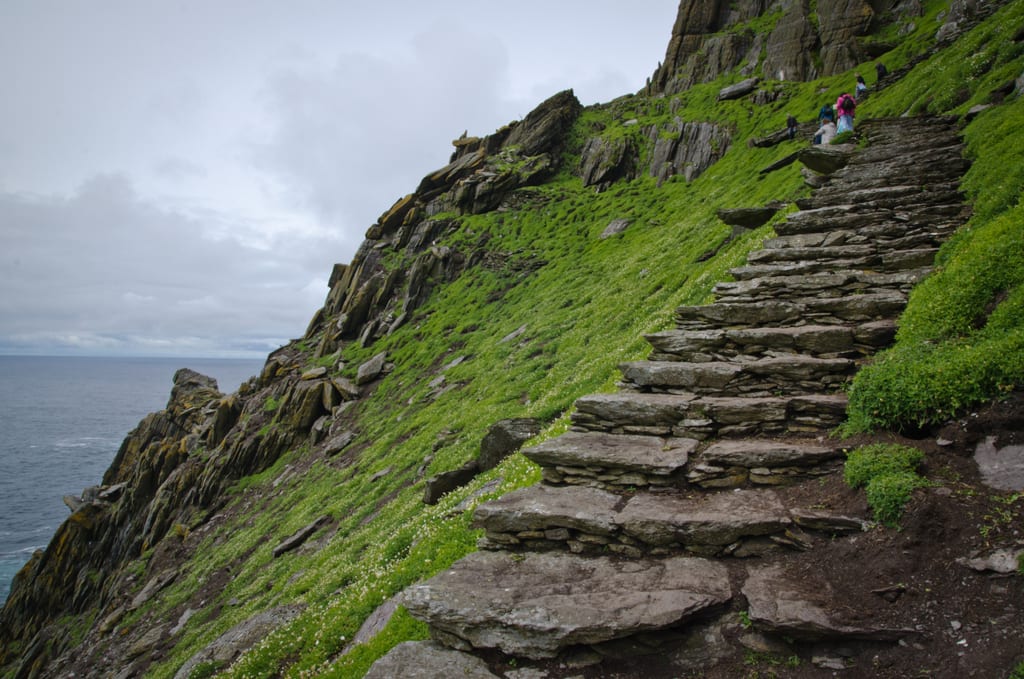
Skellig Michael’s Monastery
I’m here. I’m here. I’m here!!! I can’t remember the last time I was so excited to visit a new destination.
I had made it to Skellig Michael.
But here came the tough part: 600 steps to climb, most of them jagged slabs of rock.
I started slowly and continued at a snail’s pace, keeping my eye on every step. Speed doesn’t help you here. When I needed a break, I simply stopped — at times there was literally nowhere to stop but the steps themselves, as you’d pitch over the side of a cliff.
The scenery became more and more beautiful the further I climbed.
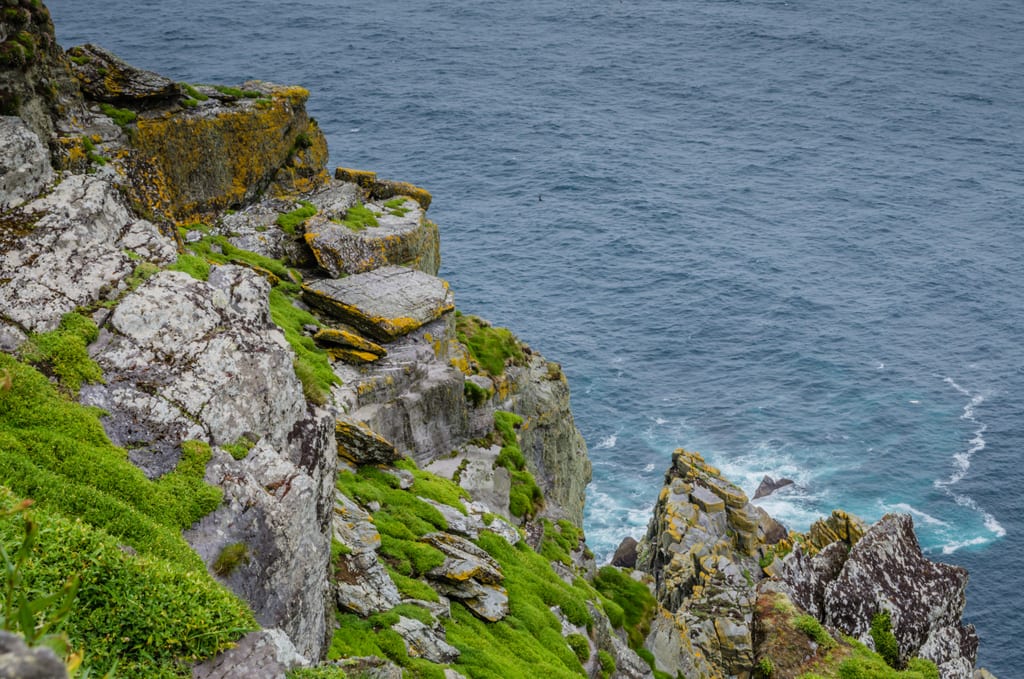
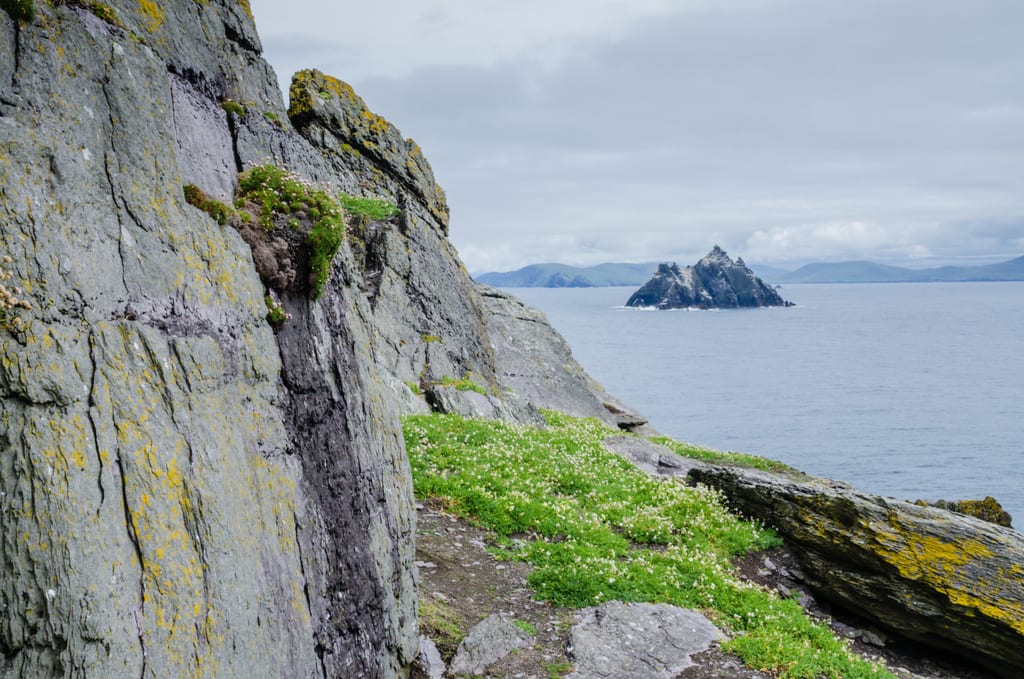
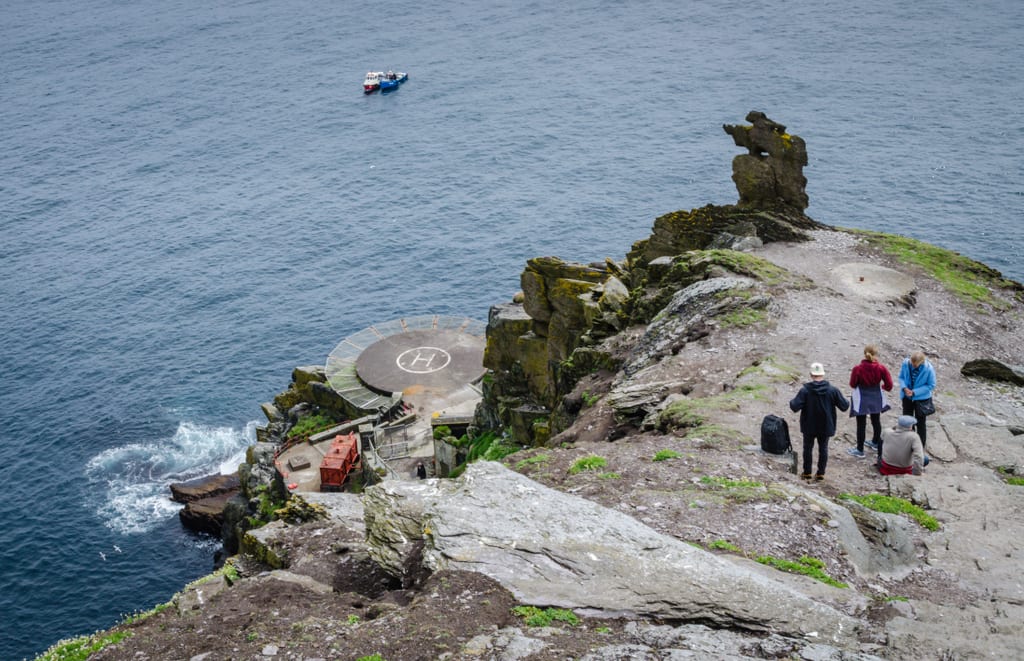
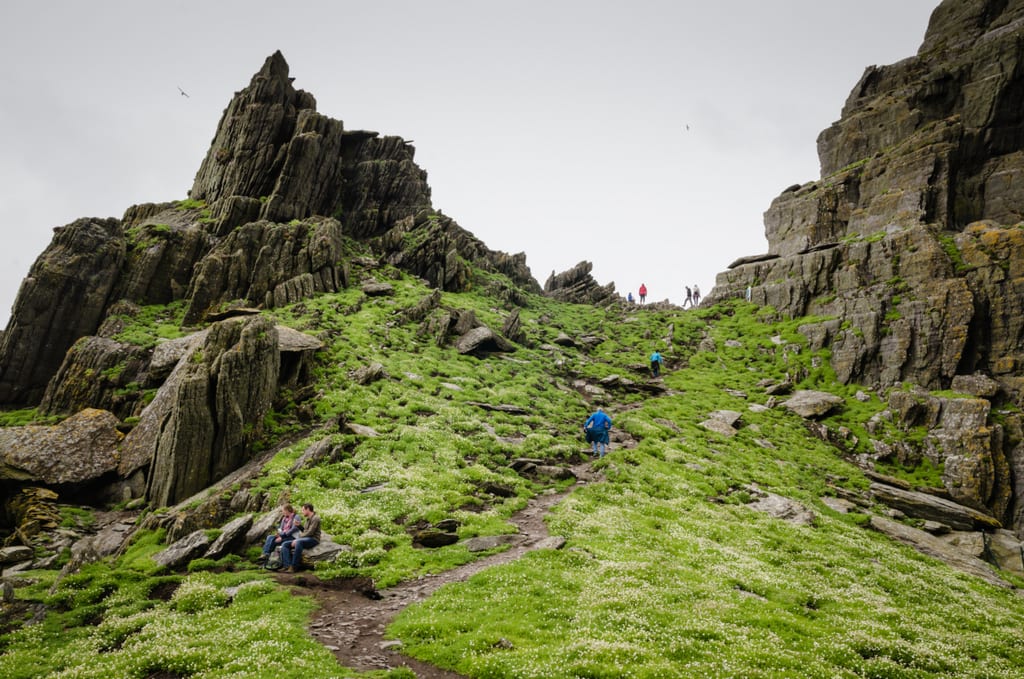
As you can tell by the photos, Skellig Michael is an exceptionally difficult place for people with mobility difficulties.
I also don’t think it’s a place for kids. It’s just too easy to fall off the path. I personally wouldn’t bring kids under the age of 12 — and even then, only well-behaved 12-year-olds who will understand the dangers and listen to you, do exactly as you say, and not go off on their own.
It’s good to know that there’s a helicopter pad on the island, just in case.
Soon I had reached a big grassy clearing with plenty of space to sit down and enjoy the sandwich that I had purchased on the mainland. There is nowhere to buy food on Skellig Michael — nor are there even toilets on the island!
The final climb led to the monastery.
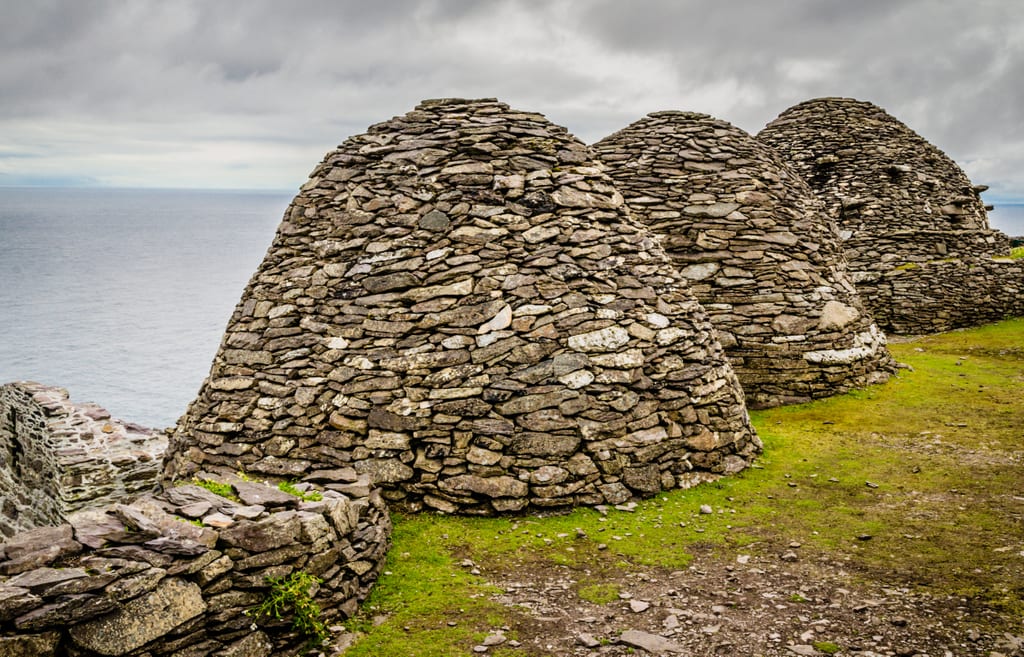
The Monks Who Chose Life on Skellig Michael
Monks first came to Skellig Michael in the seventh century and they remained here until the thirteenth century.
Very little is known about the monks. They built six beehive-shaped huts and two boat-shaped oratories, plus walls and a small graveyard. They planted gardens and lived off the land: seabirds, fish, possibly sheep and goats. They were invaded several times by Vikings and ended up baptizing at least one Viking.
At the time, Skellig Michael was not only remote and inhospitable, but it was “the end of the world” as far as the Irish knew. The monks may have chosen that destination to be closer to God, or closer to Satan, so they could defend the rest of the world.
At the Skellig Experience, a museum on Valentia Island, an exhibit reads:
Was the back breaking work of monastery building a task of penance?
Or was it a joyous, fulfilling experience of marrying hands, skill, rock and fine design?
Did the imposed isolation by a stormy sea constitute an indefinite prison sentence to be endured bravely and silently?
Or was it a soul-thrilling experience to witness the massive power of ocean waves, and the unyielding strength of Skellig rock?
Was it a dulling, stupefying monotony to hear and see nothing but the endless wheeling, screaming seabirds all day?
Or was the word of God in every flimsy feather and every trembling wingtip?
Were they motivated by joy, or by asceticism?
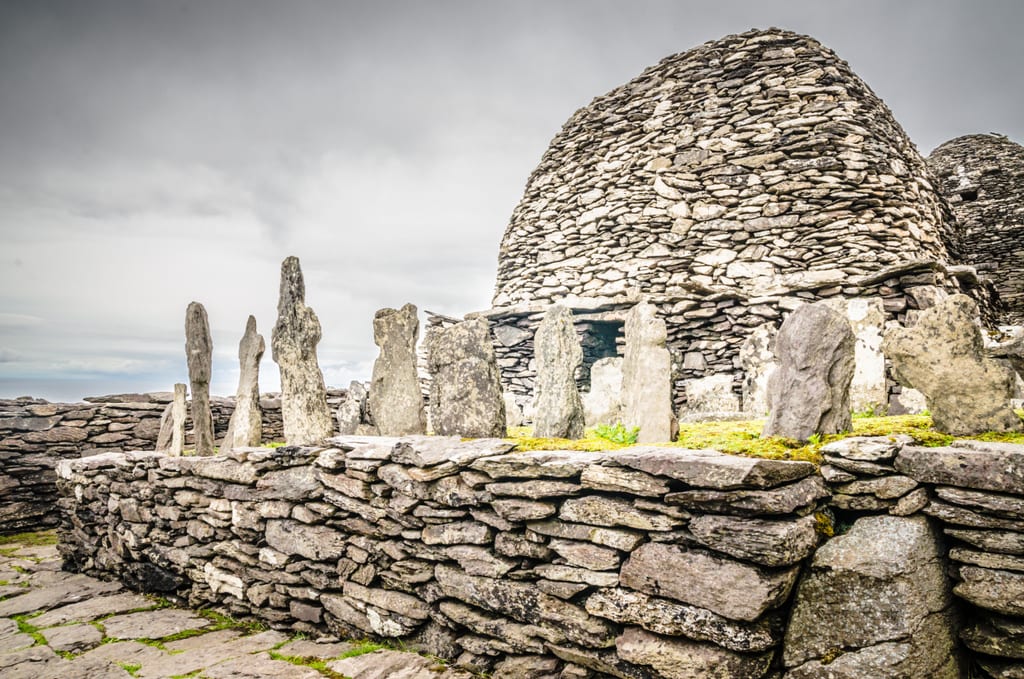
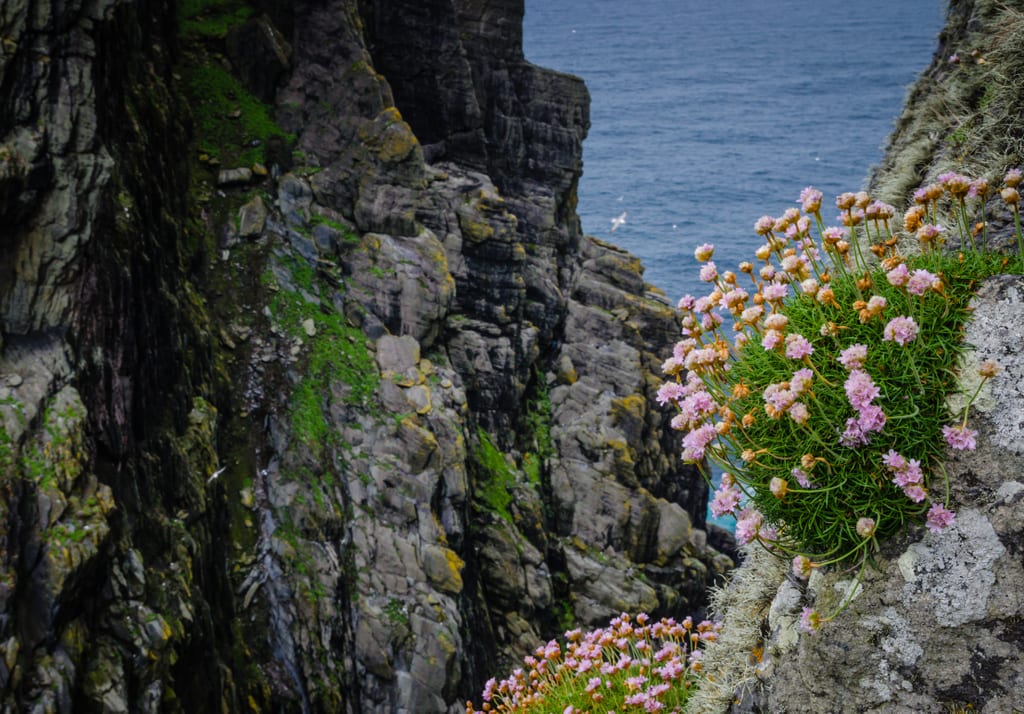
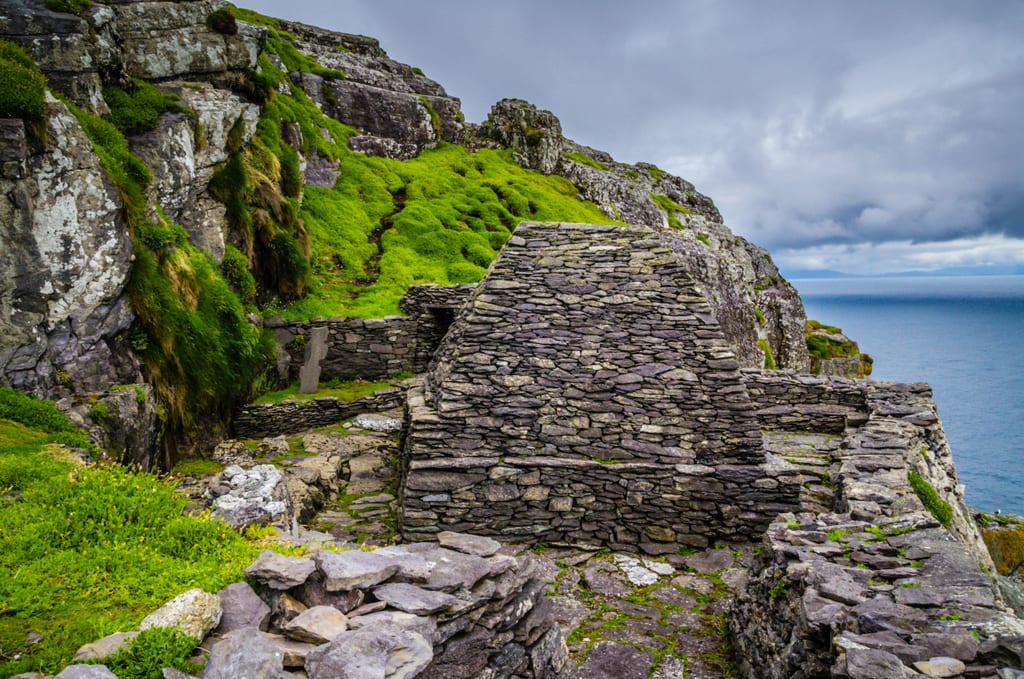
When did they build the graveyard? Right away, or did they wait for someone to die first?
Did they gather these same flowers?
Did they sit back and declare that none of God’s creations could ever be as beautiful as this island?
We will never know the answers. But I loved wondering.
This monastery is the reason why Skellig Michael was designated a UNESCO World Heritage Sites. Today, Ireland has three sites, and as much as I enjoyed Bru na Boinne and loved Giant’s Causeway, neither of them could compare to Skellig Michael.
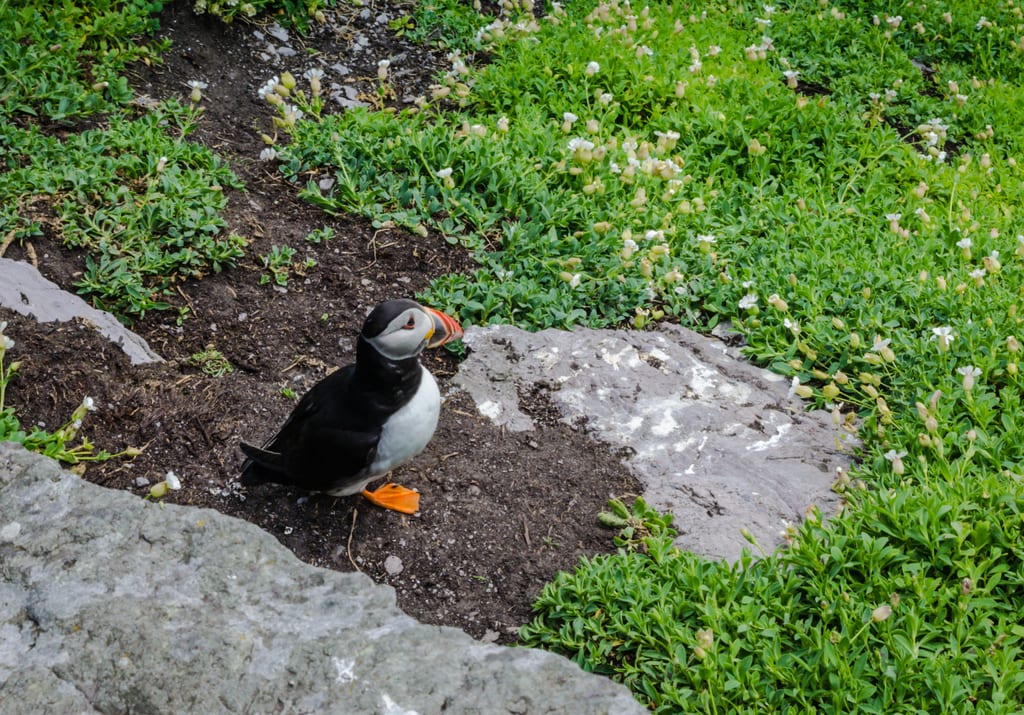
After descending from the monastery to the big grassy area, I had my sandwich and wished I could get a particular photo I had seen — a photo of the staircase leading to the monastery with Small Skellig in the background.
By this point, very few people were left on this part of the island, making it an ideal time to take the picture. I scrambled up the path on the other peak and edged out to the side until Small Skellig appeared perfectly in the background:
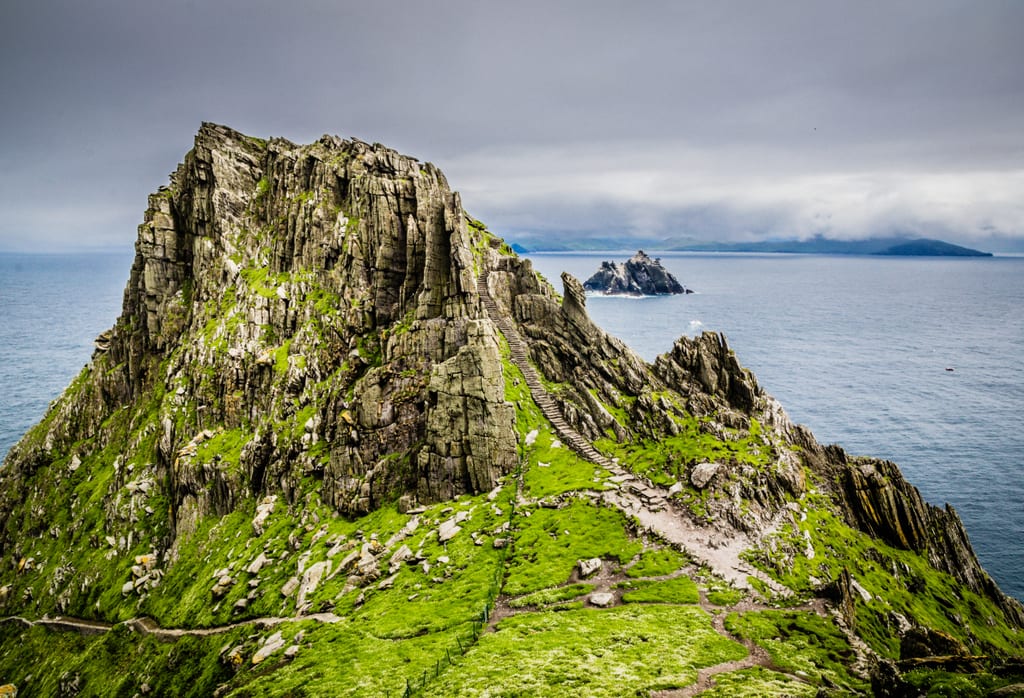
Was it worth it?
Yes. It was SO worth it.
(Though please don’t do this unless you’re comfortable climbing! This part of the island is just a rough path, rather than a staircase, and climbing down is much more difficult than climbing up!)
And soon enough, it was almost time to meet Eoin at the boat. I climbed down the 600 steps as carefully as I climbed up them.
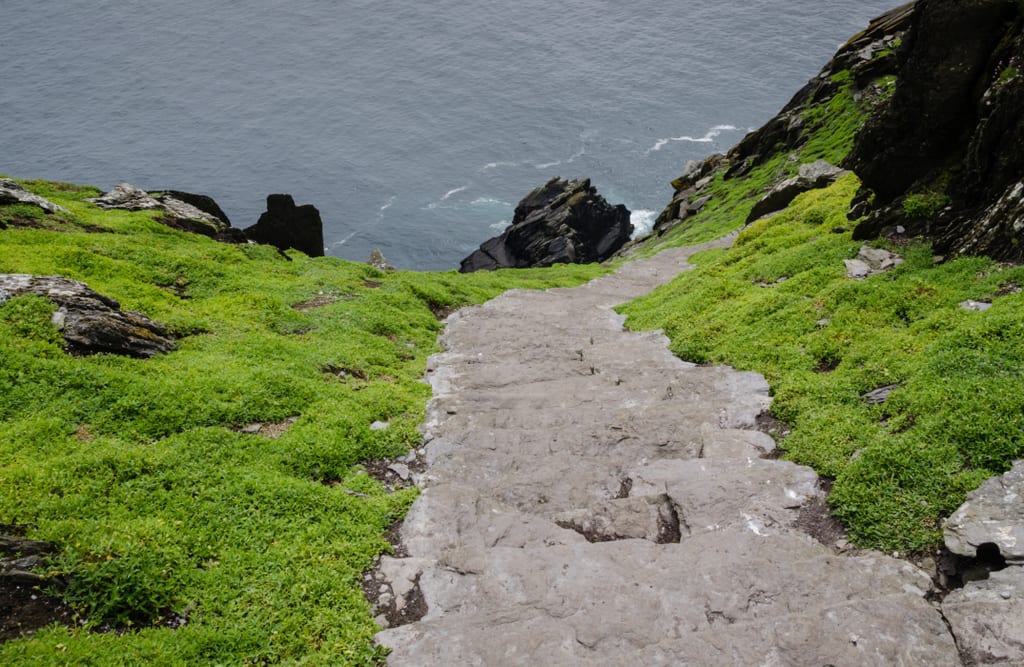
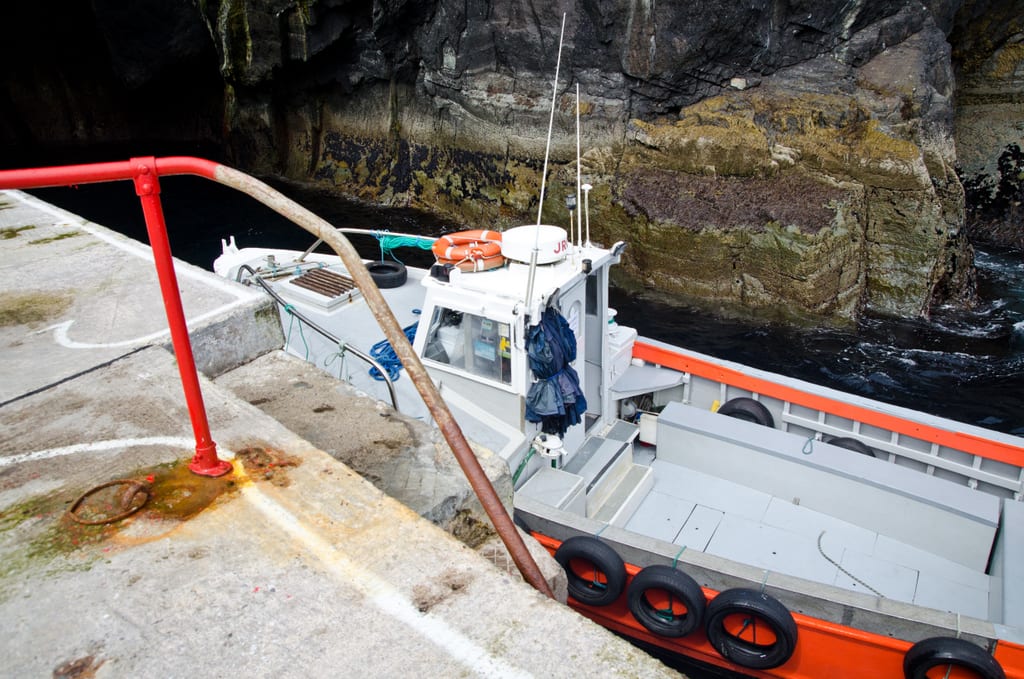
Back to the Mainland
As I met Eoin at the dock, I saw first-hand how this had almost been a no-go day. The boat rose and fell next to the steps and even though it seemed safe every 10 seconds or so, Eoin wouldn’t let me step on for a full minute, until a particularly boisterous wave gave him the signal to pull me on board.
How on Earth did the monks land here?! I thought, a sentiment shared by my three companions from County Cork. It was so difficult to land in modern times — how did they land on the rock in the middle of the stormy Atlantic with only ancient technology!
What an incredible test to live their chosen life.
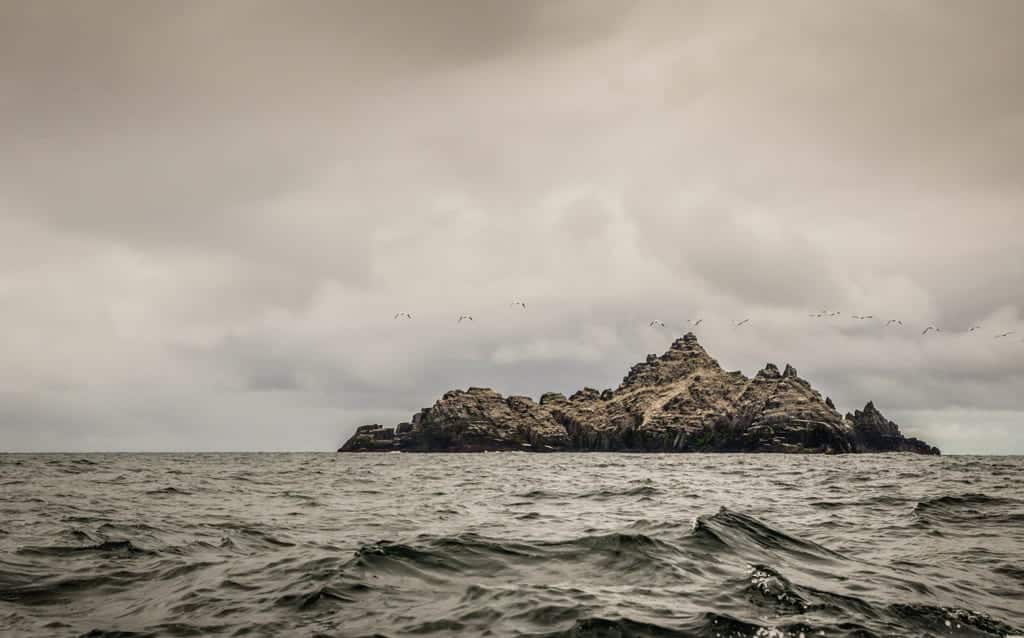
We took a quick spin around Small Skellig, home to more than 27,000 pairs of birds, then set off on the 90-minute journey back to the mainland.
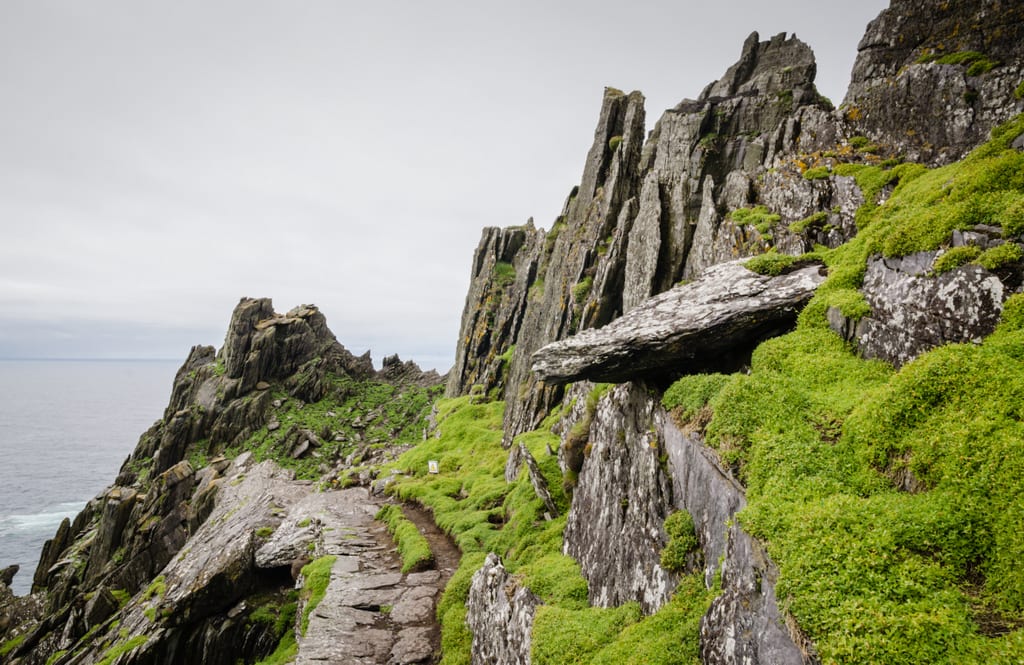
Planning a Trip to Skellig Michael
I was lucky that our boat was able to land on Skellig Michael on my first day there, but you shouldn’t take the risk I did. Instead, rent a car and plan to spend a few days based in pretty Portmagee. Go to Skellig Michael when the conditions allow you to, and on the other days, there’s quite a lot to see in the immediate area, on Valentia Island, and throughout the Ring of Kerry.
One nice thing about Portmagee is that the roads are too narrow for big buses, so you don’t see any of the huge coach tours that dwarf the rest of County Kerry. Portmagee attracts intentional visitors, which is something you can’t say for, say, Killarney.
I stayed at the most delightful guesthouse — The Moorings. It’s a cozy place on the waterfront with nice rooms and incredibly soft sheets, and it has both a restaurant and a casual pub. The rates (starting at €60-70 ($81-95 USD) per night) are incredibly reasonable for this part of the world.

Gerard, who owns The Moorings with his wife, Patricia, offered to join me for dinner (and I nearly kissed him, I was so thankful! As a solo traveler, I eat alone all the time and while I don’t totally hate it, it’s so nice for someone to offer to join you once in a while!).
If there’s any massively true stereotype about Ireland, it’s that the Irish are incredibly friendly and full of stories, their lilting voices like music. Gerard certainly fit this criteria.
“Is all your food local?” I asked him as I dined on astoundingly fresh oysters and scallops.
Gerard furrowed his brow for a moment. “Everything…except the mussels,” he told me. “We get those 15 minutes away.”
He said this without a trace of irony and was startled when I burst out laughing.
Staying in such a cozy guesthouse, eating the best scallops of my life, enjoying great conversation with a new friend — it was the perfect coda to a wild day journeying to and exploring Skellig Michael.
Days like this are what you dream of when you plan a trip to Ireland, and I’m so glad I got to experience a day like this on my trip.

If you’re planning a trip to Ireland, plan it around Skellig Michael.
I’m completely serious.
Skellig Michael went far beyond my expectations and was the highlight of my trip to Ireland. If you’re interested in visiting, I recommend that you make it a high priority and build out the rest of your trip from there.
This is one of the most impressive sights I have ever seen, and I can’t recommend it enough.
Like Skellig Michael? You might also like:
The Wild Raw Beauty of Shetland
The Dark Side of the Scottish Highlands
Fun and Culture in Limerick, Ireland
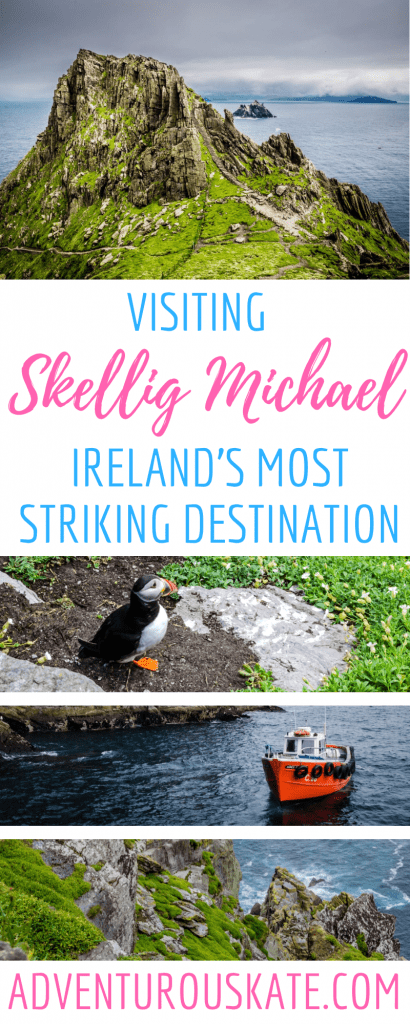
Skellig Michael Essential Info
Most trips to Skellig Michael, which are very choppy and take 90 minutes each way, are priced at €50 ($68 USD). I visited Skellig Michael with Eoin Walsh, whom I recommend. The website has been down for awhile, so I’m not sure whether he is still in business.
There are no toilets on Skellig Michael, nor is there anywhere to buy food, so buy food in town beforehand. Due to the sharp cliffs and rough stairs, Skellig Michael is not for children or people with mobility challenges.
The Skellig Experience, a museum on Valentia Island, just across from Portmagee, is well worth a visit for learning about the history of the island. Tickets are €5 ($7) for adults. This is a good place to buy sandwiches and drinks to take to Skellig Michael.
Rates at The Moorings start at €60 ($81 USD) per night in low season and €70 ($95 USD) per night in high season. Find more hotels in Portmagee here.
Remember to buy travel insurance before you visit Ireland — it could save your life or your finances! I use and recommend World Nomads for trips to Ireland.
Many thanks to Ireland Tourism for hosting my trip to Skellig Michael and my night in Portmagee. All opinions, as always, are my own.